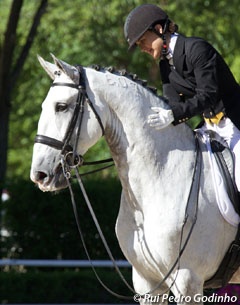
In my experience there are two types of brilliant horses. One is the ego master, who is very full of himself and loves to show off. The other is extremely sensitive and rather timid and lacks natural confidence. Of course there are all the variations in between, but what most top horses have in common is the need for positive reinforcement, and I’m not just talking about when the good thing actually happens.
I know that Batialo does not like to start in the indoor and then go outside to the outdoor in the middle. He feels that when he finishes inside, he is done for the day, and quite often has a small tantrum when I begin the work again outside. You might have a similar scenario at meal times, or when it’s windy, and you find that you go out on the arena already prepared to have a difficult training session. There are ways to combat this, and it comes down to understanding the psychology of your horse.
One day I finished inside and took Batialo to the outdoor arena, and before I even set foot on the surface I began patting him and telling him he was amazing. His ego loved it of course, and he forgot all about the fact he might have finished and worked brilliantly for another 20 minutes, with me praising him the entire time.
On a more sensitive nervous horse, you need to do this constantly. You need to give them the confidence that they themselves lack. You need to pat them and tell them it’s ok. You can’t wait until they are frightened to start the reassuring process. Often we wait until the mistake and then we discipline the horse, but what if we pre-empted the mistake through positive reinforcement. By making sure the horse understands that he is amazing, or he can be confident nothing will happen.
Top riders do this with their position. Their position is so naturally stable and tension free that the horse automatically feels reassured. If you are like me and have the tendency, even when you think you are completely relaxed, to still be a little nervous, then the positive reinforcement can actually help to calm you as well. It gets the horse thinking in a positive way and you connect with him by focusing just on the present moment.
Horses with big egos need to be reminded how amazing they are or they get bored very quickly. Horses with sensitive, shy natures need to be reassured even before they begin to think of being afraid of something. Horses that don’t fit into either category also need positive reinforcement. It’s about understanding and connecting with the horse when you begin riding.
Too many times I have gone out onto the arena and only after 5 minutes do I actually tune myself in to the horse and what he is feeling, and how I am feeling. That is why I appreciate the ability to use positive reinforcement even before I get on the horse. When I get him from the stable, I tell him he is amazing. When I am grooming him I connect with him, I tell him he is good, I talk with him.
We know this and yet we can get into a routine, or we are tired, or our mind is focused on other things, and we forget that our sport is about a partnership, and that partnership begins well before we set foot in the saddle. As you are walking to the arena, you can notice how your horse feels, where he is tense, if he is lazy or alert. Are you tense? Are you focused? And then you begin telling him again he is great, everything is good, passing on the positive energy, and in the meantime turning your focus to the positive, rather than worrying about what might go wrong.
It seems so simple and yet quite often we just hop on and begin and ten minutes in when we feel like we are in a big muddle, we start to think about how to correct it. How about putting the good foot forward, and stepping into the arena, connected and positive about the ride ahead, it may just make all the difference!
by Sarah Warne - Photo © Rui Pedro Godinho